Accounting Theory and Current Issue
Added on 2020-04-01
22 Pages4753 Words42 Views
Running head: ACCOUNTING THEORYAND CURRENT ISSUEAccounting Theory and Current IssuePage 1
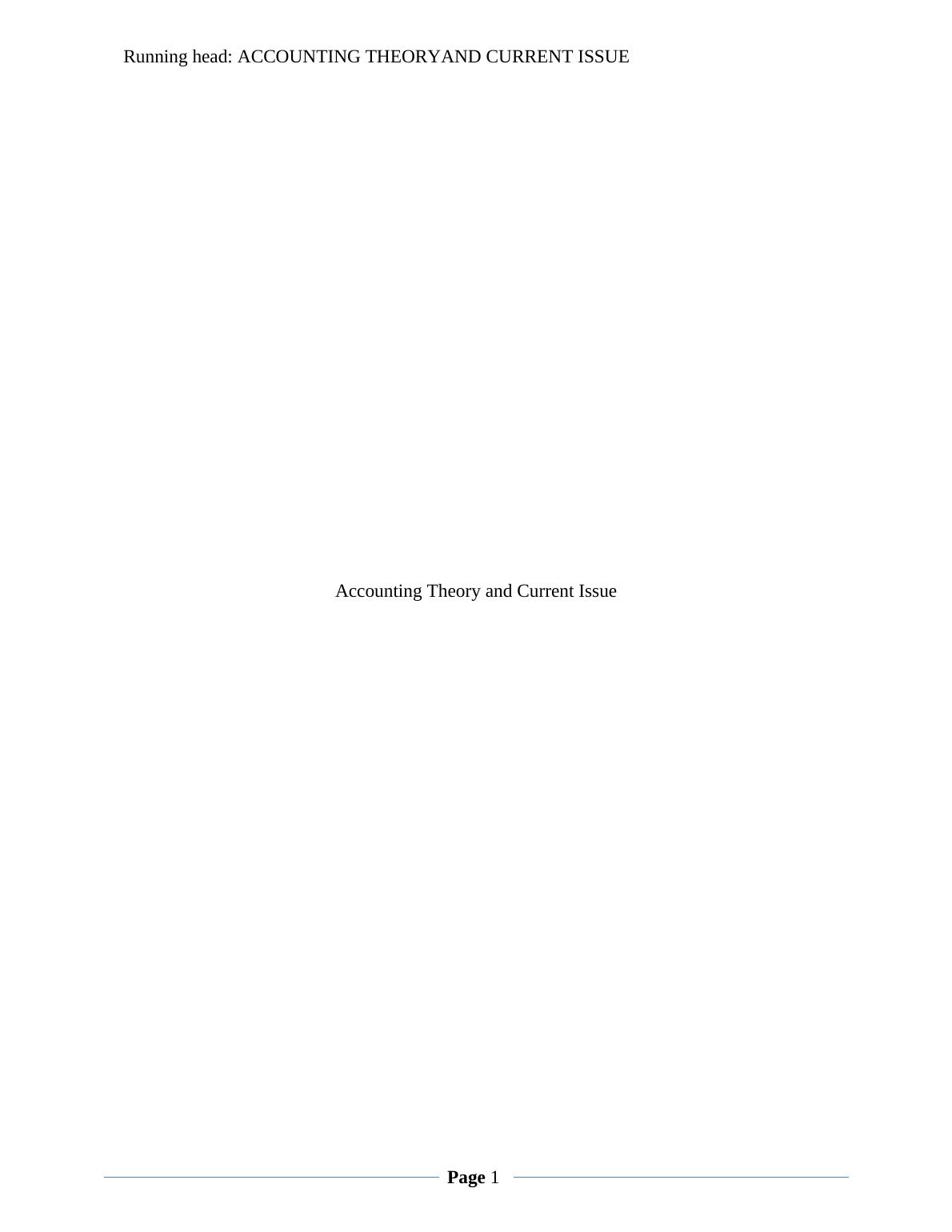
ACCOUNTING THEORYAND CURRENT ISSUEExecutive SummaryPositive practices as well as normative practices of accounting theories were explained in the study, where the use of facts as well as figures in the current as well as future situation was provided. Accounting policies, principles as well as estimates with respect to Australian Pharmaceuticals Industries Limited was assessed, where flexibilities, comparison with the competitors along with red flags among other were discussed. Additionally, critical evaluation ofthe pressures forced on API Ltd by numerous factors influencing the setting of accounting standard in business environment, were also analyzed. Moreover, possible implications of API, considering accounting choices along with disclosures were discussed. Furthermore, an investigative report as well as accounting strategy of the managers was critically evaluated, where the importance of AASB, IASB as well as the Corporations Act 2001 was justified. Page 2
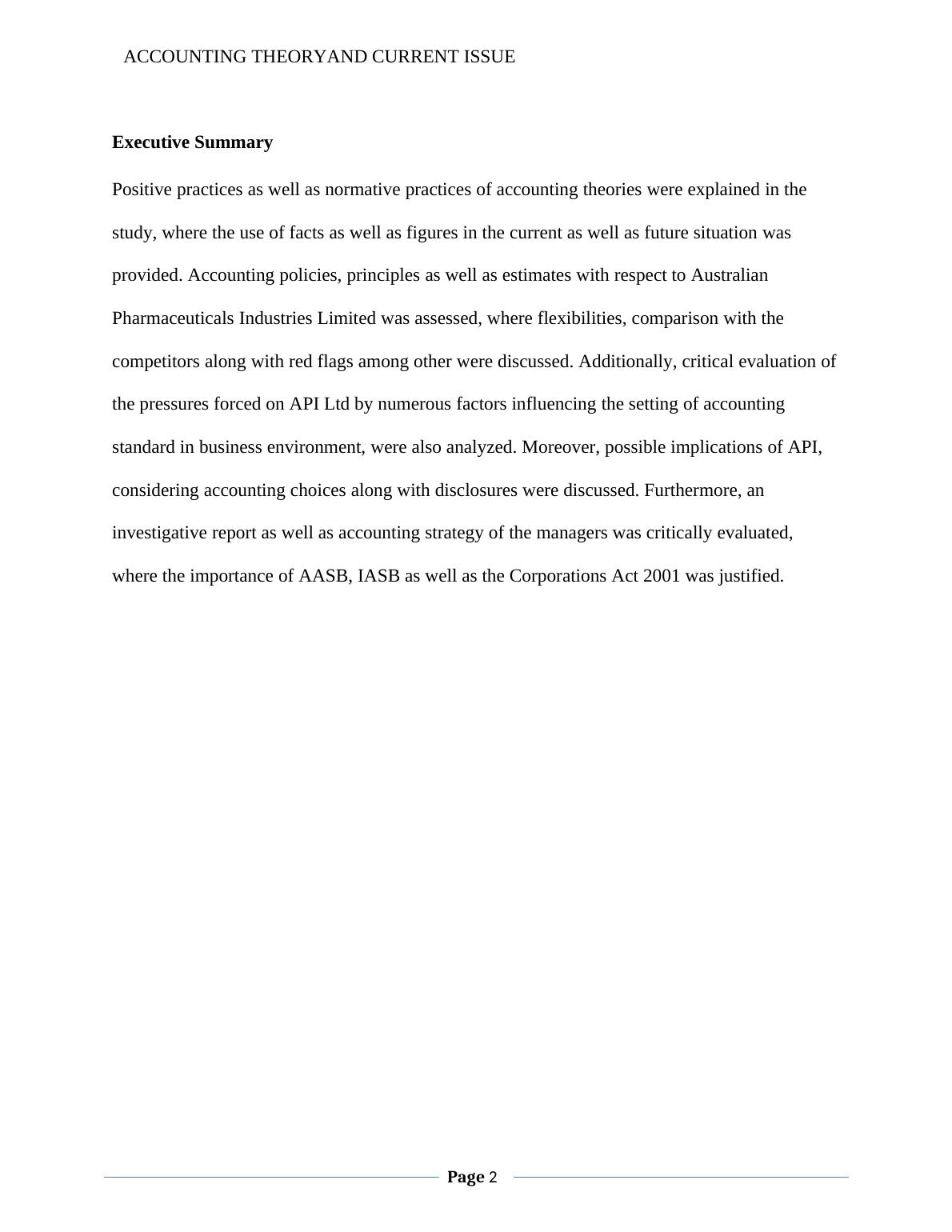
ACCOUNTING THEORYAND CURRENT ISSUETable of ContentsExecutive Summary.........................................................................................................................2Introduction......................................................................................................................................5B. Assessment of Accounting Policies and Estimates.....................................................................6i. Accounting Policies and Estimates Used by API.....................................................................6ii. Flexibilities Regarding Accounting Policies and Estimates....................................................7iii. Accounting Policies and Estimates Used by Its Competitors................................................8iv. Comparison of Accounting Policies and Estimates used by Sigma Healthcare (SIG)...........8v. Agreement Over Polices and Estimates...................................................................................9vi. Hidden or Revealed Accounting Strategy..............................................................................9vii. Red Flags or Questionable Numbers considering the Annual Report.................................10viii.Accounting Positions Capturing the Red Flags..............................................................10C. Evaluating accounting quality by Assessment of Accounting Policies and Estimates.............11i. Various Pressures Influence the Setting of Accounting Standard in the Environment..........11ii. Implications of Organizations Considering Accounting Disclosures...................................12iii. The Possible Implications of an Organization Making Particular Accounting Choices andDisclosures.................................................................................................................................12D. An Investigative Report on the Managers’ Accounting Strategy and Reporting Strategy.......13Section 1. Identification of Key Accounting Policies...............................................................13Section 2. Assessment of Accounting Flexibility......................................................................14Section 3. Evaluation of Accounting Strategy...........................................................................14Section 4. Evaluate the Quality of Disclosure...........................................................................15Section 5. Identification of Potential Red Flags........................................................................15Section 6. Compliant with the Conceptual Framework.............................................................16Conclusion.....................................................................................................................................16References......................................................................................................................................17Bibliography..................................................................................................................................19Page 3
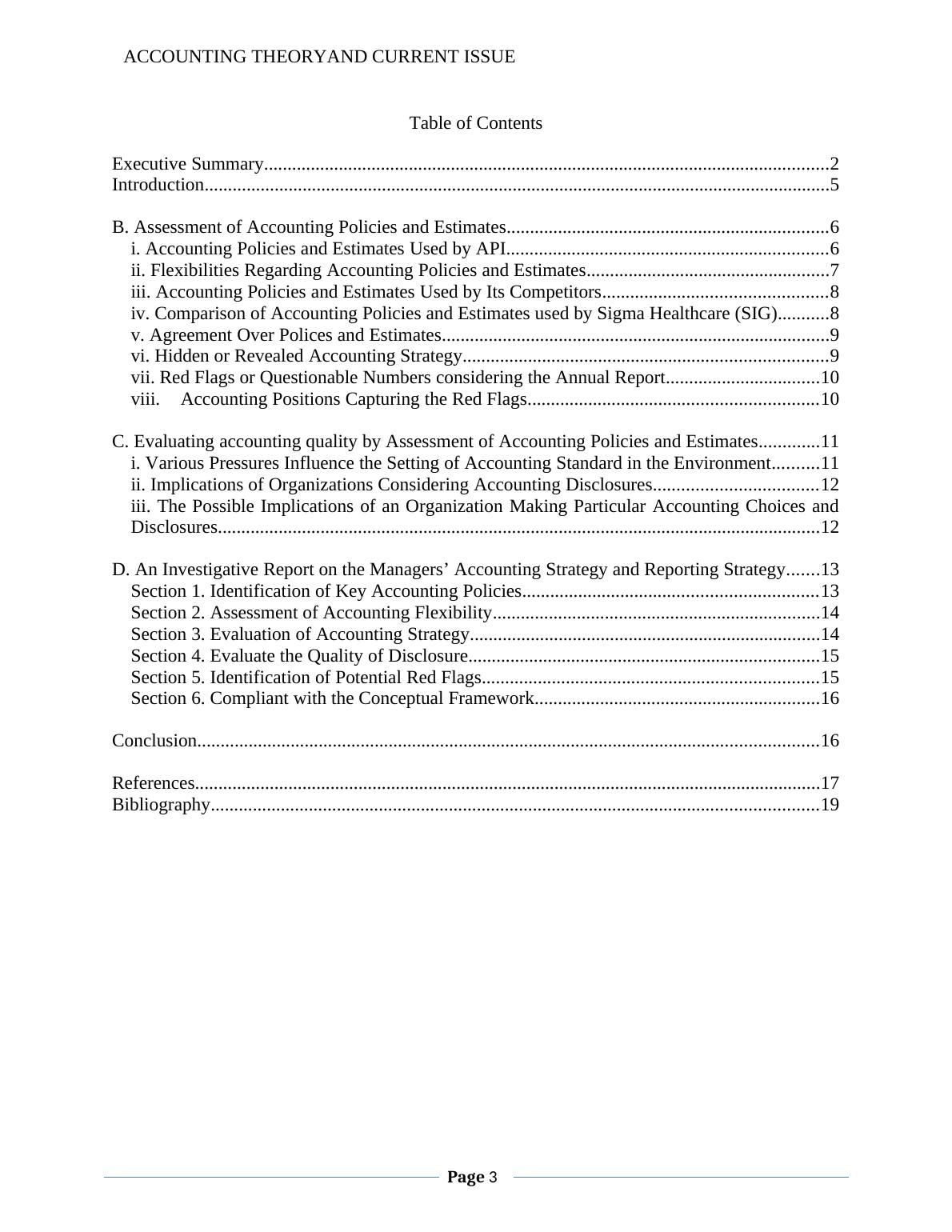
ACCOUNTING THEORYAND CURRENT ISSUEIntroductionPositive theories for accounting practices as well as economics are based upon facts and figures of the organizations, where they are audited and produced. Positive theories of accounting emphasize deriving results by analyzing the company data along with economical statistics. Majority of the data collection and bookkeeping processes are related to positive theory of accounting. However, normative theories of accounting focus on describing the economic future of the organizations along with its stockholders or investors. Therefore, normative practice of accounting helps in value judgment of the future events by analyzing the present circumstances. Normative accounting does not deal with backdated data, which comes under the field of positive practices of accounting (Griff, 2014; Chatfield, 2014). Therefore, the paper focuses on using data collected from the annual reports of Australian Pharmaceutical Industries Limited, where positive and normative theories of accounting are analyzed. Australian Pharmaceutical Industries Limited is one of the leading wholesalers of medical, pharmaceutical, beauty, health as well as lifestyle products to the pharmacies all across Australia and New Zealand. It deals in manufacturing, distributing along with retailing of the pharmaceutical products. The company is listed under Australian Securities Exchange (ASX) and currently trading at $1.433 per share (InvestSMART Financial Services Pty Ltd, 2017). Few subsidiaries operating under Australian Pharmaceutical Industries Limited (API) include Priceline Pharmacy, Pharmacists Advice, Soul Pattinson Chemist as well as Priceline. Some of the healthcare services provided by the API are conducted by Club premium, Priceline protects Insurance, Priceline sister’s club and Priceline sisterhood foundation. Stephen P Roche is the CEO of API (API, 2017; InvestSMART Financial Services Pty Ltd, 2017).Page 4
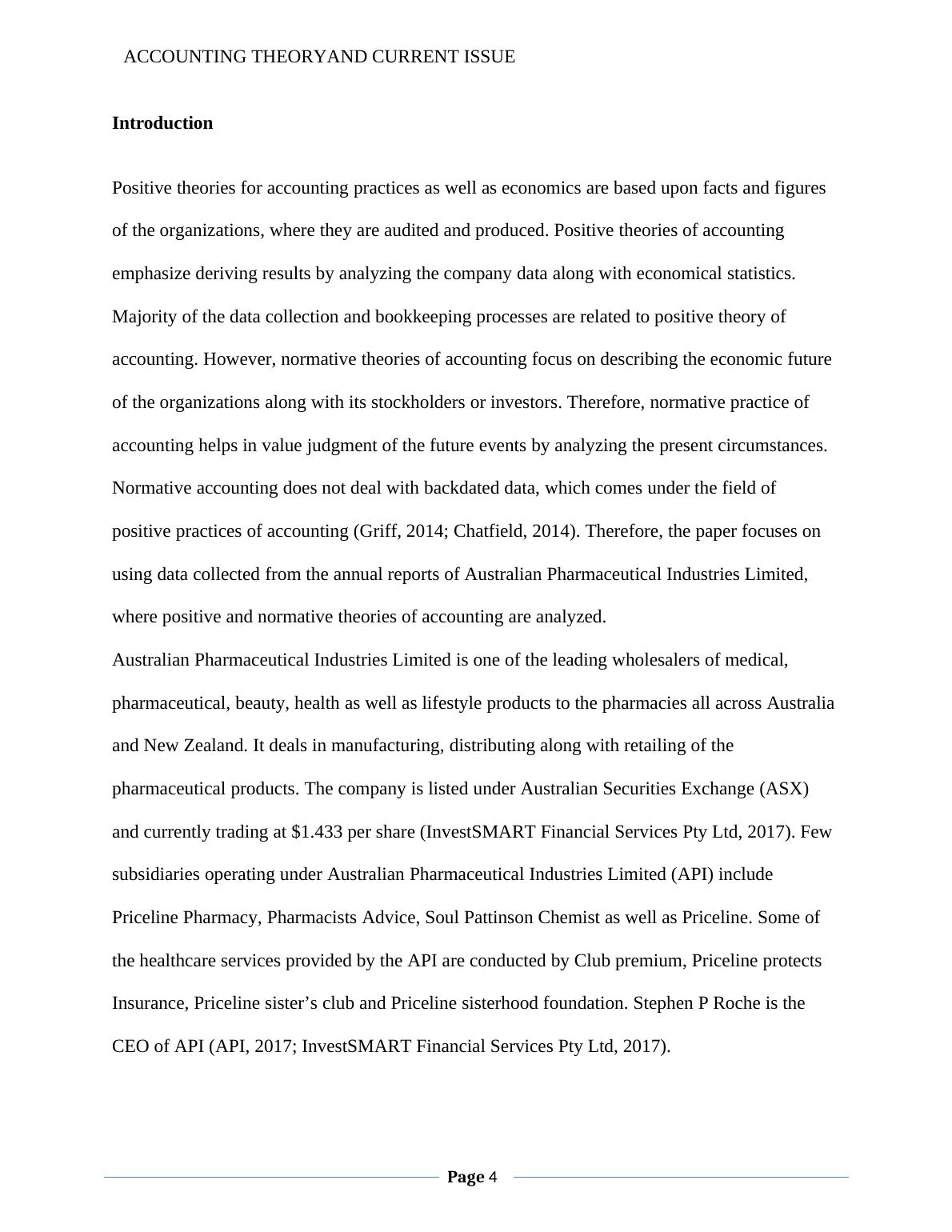
ACCOUNTING THEORYAND CURRENT ISSUEThe paper explores the assessment and evaluation of accounting policies along with estimates considering the API, where investigation is conducted on accounting as well reporting strategy ofthe company managers. Additionally, in-depth accounting standards and framework is applied during the process, where accounting flexibility is assessed, strategies as well as qualities related to disclosure is evaluated and potential red flags is identified, which completes the paper objectives.B. Assessment of Accounting Policies and Estimatesi. Accounting Policies and Estimates Used by APINumerous essential accounting standards, polices as well as estimates are used by API. The company follows the regulations and amendments under Australian Accounting Standards Boards (AASB). Measurement and recognition of financial instruments was approved under AASB 9 replacing AASB 139. Moreover, AASB 15 and AASB 16 are followed for determining the revenue from customers along with classifying leases respectively (API, 2016; API, 2015).Accounting policies based on consolidation includes subsidiaries, eliminated transactions during consolidation and associates. Moving forward to policies, the transactions related to foreign currency as well as foreign operations is often observed to be related. Accounting policies for financial instruments includes five key heads, which are non-derivate, derivative ordinary shares,financial guarantees and securitized receivables. Non-derivates financial instruments include further policies regarding receivables, trade payables, current liabilities and cash along with cash equivalents. Derivate financial instruments include cash-flow hedges, while the ordinary shares comprise dividends (API, 2016; API, 2015). Accounting policies for plant, property and equipment includes recognition along with measurement, de-recognition, disposal of plant, Page 5
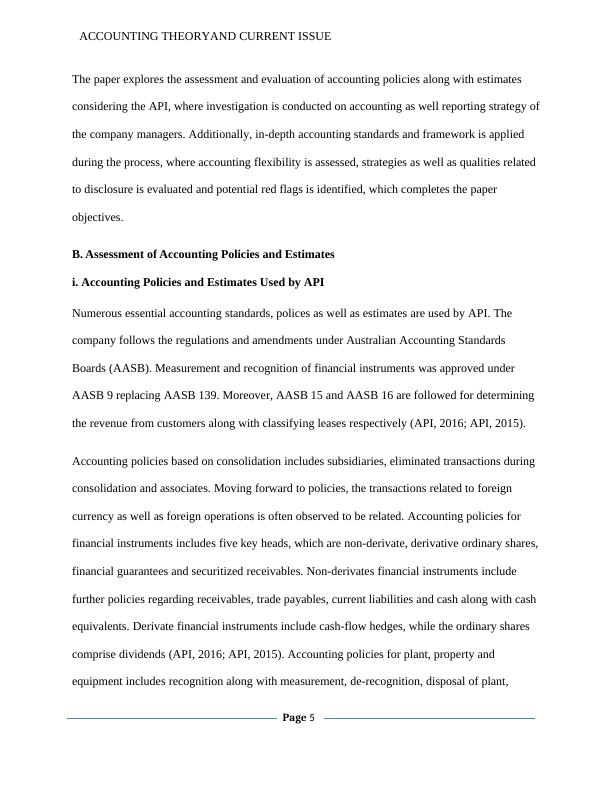
ACCOUNTING THEORYAND CURRENT ISSUEproperty or equipments and depreciation. API also includes accounting policies regarding goodwill and intangible assets, where goodwill, brand names, software, research as well as development and subsequent expenditures. Inventories and leases are key aspects of the accounting policies of API. Impairment policies comprise financial assets, non-financial assets, calculating the recoverable amount as well as impairment reversals. API holds proper accountingpolicies considering employee benefits, which includes adequate salaries, wages and yearly leaves along with non-monetary benefits. This involves leaves related to long service, defined contribution superannuation funds, benefit pension plans and transactions allied to share-based payments (API, 2016; API, 2015). Accounting policies for provisions consist of onerous leases, creating good obligation through dismantling and provisions related to sister club. Accounting policies regarding revenues comprises selling of goods, Community Service Obligation (CSO), membership along with brand fees, service charges form franchises, promotional income from marketing activities, loyalty cards and interest received upon overdue accounts. Besides, API also holds some additional accounting policies with respect to net costs related to finance, Income Tax, assets held-for-sale and operating segments (API, 2016; API, 2015).Considering the accounting estimates, API needs to make judgments based upon assumptions and estimates, while preparing the financial reports. Some of the estimates made by the companydirectors of API include carrying value of brand names, goodwill, loans along with receivables tothe pharmacy customers and inventory. Additionally, useful lives of the assets are also estimated.Furthermore, provisions arising due to leases are assessed, in addition with the settlement of shared-based payments (API, 2016; API, 2015).Page 6
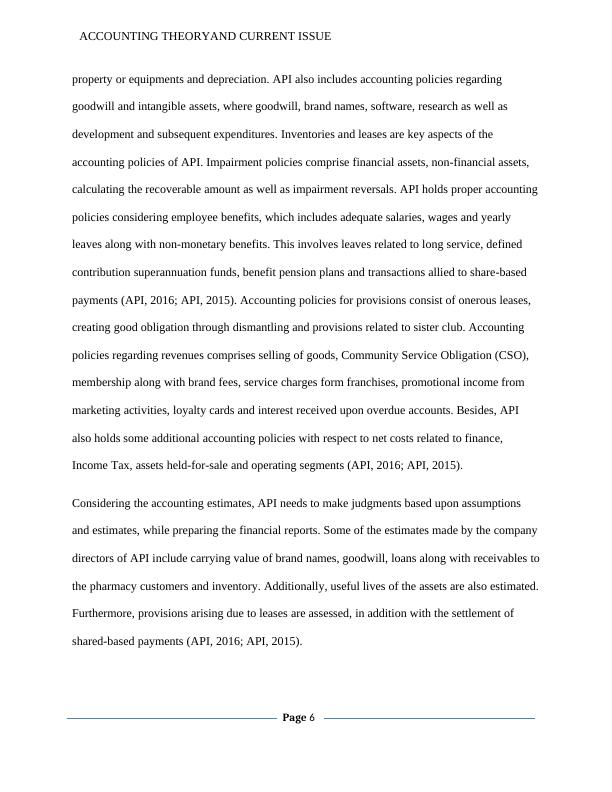
End of preview
Want to access all the pages? Upload your documents or become a member.
Related Documents
Accounting Theory and Current Issues Evaluation of an ASX Listed Company A-Cap Resources Ltdlg...
|23
|4653
|400
Accounting Theory and Current Issues Reportlg...
|21
|4102
|97
Accounting Theory Assignment | Financial Reportlg...
|15
|4324
|114
Assignment on Accounting - Telstralg...
|17
|4247
|224
HI6025 Accounting Theory & Current Issueslg...
|29
|4378
|122
Report on Accounting Theory and Issueslg...
|13
|3612
|31
